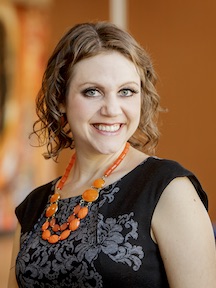By Peter Scamardo
There are 286 chapters of Phi Beta Kappa at colleges and universities across the country. Some institutions host chapters that have a history stretching back 200 years or more, while more recent chapters are just beginning to build their legacies.
Members inducted by the Society’s newest chapters, like Ashleigh Hildebrand Ross of Oklahoma State University, are helping to build those storied traditions. And she knows from experience how fulfilling such prestigious awards can be.
Ross was inducted into Phi Beta Kappa as an alumni member in 2018. This category of membership recognizes individuals who are worthy of induction but who did not have the opportunity while still at the university. The chapter at Oklahoma State was founded in 2013, several years after Ross completed her bachelor’s degree there.
“Being inducted into the most prestigious liberal arts and sciences society, when I am most often identified as an engineer, feels like such an immense and precious honor,” Ross said. “It is a reflection of the impact that education has had on me, my work, and my career, and that it has made a tangible difference. To be counted among this community is remarkable.”
Ross’ induction into Phi Beta Kappa is just the latest of her accomplishments, both in academia and in her career. While completing her chemical engineering degree at OSU in 2005, Ross had the opportunity to apply for the Gates Cambridge Scholarship.
The scholarship provides graduate students with full funding towards the pursuit of their degree at Cambridge University.
For Ross, going to Cambridge for graduate school had been a goal of hers for some time. However, she said the scholarship provided her with more than just entry into Cambridge. It welcomed her into the community of fellow Gates Scholars, introducing her to individuals who would become resources and indeed friends.
Ultimately Ross’ time in Cambridge changed the course of her career. “I had been set on a certain trajectory since I was 12,” Ross said. “And although my Cambridge education was a side-step from my plan, when I returned to the plan I realized that it wasn’t the right one for me at all. More specifically, I discovered that I couldn’t be happy with environmental objectives as an ‘incidental’ effect of my work – it had to be the primary focus.”
That shift in direction led Ross to earning a master’s degree in environmental policy before later earning a double master’s in chemical engineering and technology and policy at MIT. Now employed by energy giant BP, Ross’ work focuses on carbon capture and storage, a means of reducing greenhouse gas emissions from a variety of energy and manufacturing sources.
Ross, who is also in remission after a bout with cancer, has been given chance after chance to be successful and has come out on top time and again. For her, it all goes back to her undergraduate days at OSU and the opportunities presented to her.
As Ross explained it, being inducted into Phi Beta Kappa is more or less a return to where it all began. She said the availability of scholarships and research funds at OSU got her academic ball rolling and helped her build her network. Having a Phi Beta Kappa chapter at OSU offers students another opportunity for success.
“It feels like the doors of opportunity at OSU are always open for anyone who wants to walk in,” Ross said. “For students, never discount that Phi Beta Kappa represents an additional open door. The opportunities and friends are yours, if you are just willing to walk through.”
Peter Scamardo is a senior at the University of Houston majoring in English with a concentration in creative writing. He is also interning at the Houston Chronicle this fall. The University of Houston is home to the Mu of Texas Chapter of Phi Beta Kappa.




